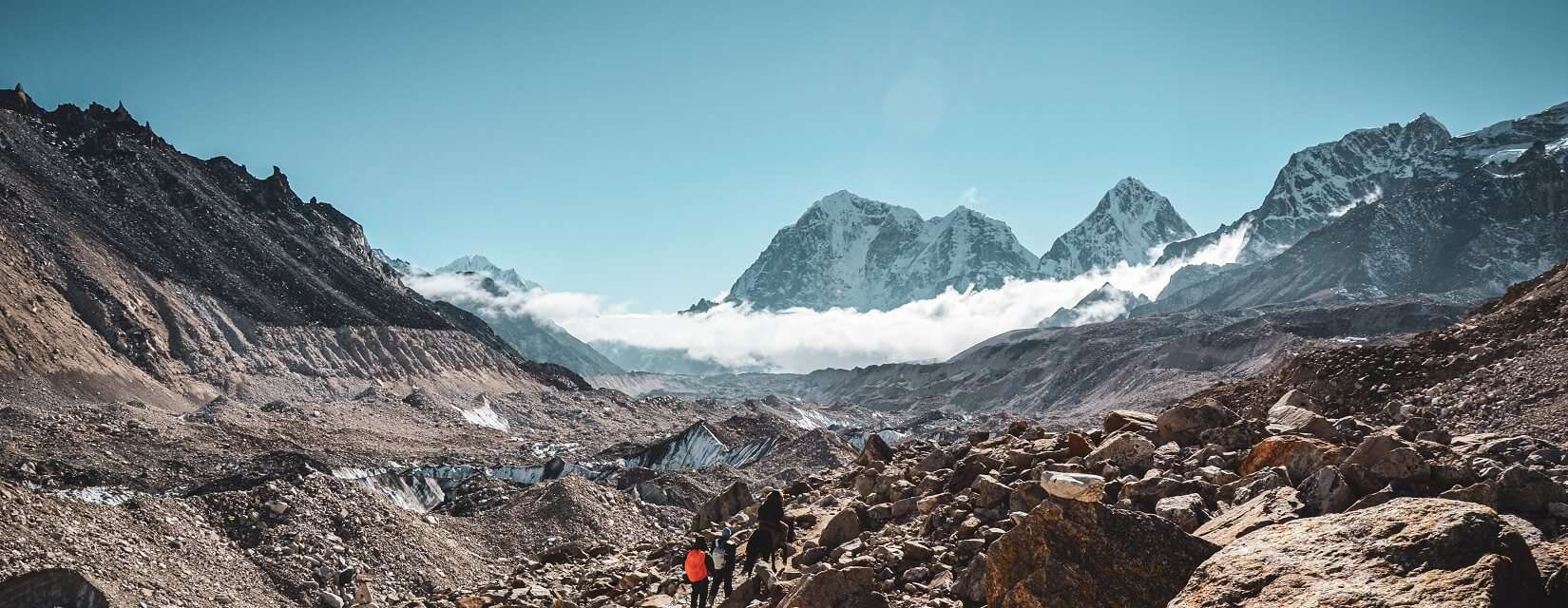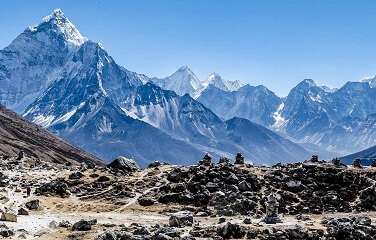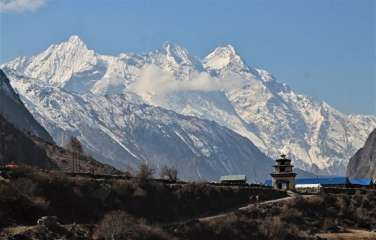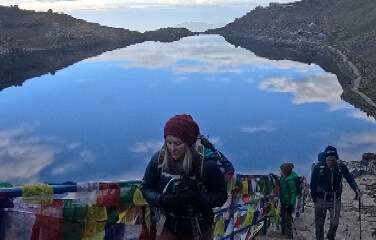Where is Everest Base Camp (EBC)?

The North Base Camp in Tibet and the South Base Camp in Nepal are the actual Everest trekking base camps. The terminus of this fabled trek is the Nepalese camp in the Khumbu region, which is commonly referred to as Everest Base Camp. It's hidden away at the end of a long valley that splits at the Sherpa village of Dingboche and cuts through the Himalayas. Right outside the camp, the formidable Khumbu Icefall, the first challenge for those attempting an Everest summit push, starts to ascend to the Western Cwm, also known as the Valley of Silence, and the peaks of Lhotse and Nuptse.
Lukla Airport

Before beginning their trek to Everest Base Camp, tourists arrive at the Tenzing Hillary Airport. At 2,850 meters above sea level, Lukla Airport is one of the world's most perilous airports, with extremely condensed take-off and landing strips. From Kathmandu, the flight to Lukla will take about 30 to 40 minutes, and the weather there is always difficult to predict. In 1964, the Lukla Airport was constructed. The building was overseen by Sir Edmund Hillary, and the airport runway wasn't even properly paved until just a few years ago, in 2001. There are mountains and steep terrain all around the airport. There is a wall at one end and a sharp drop into the valley below at the other.
At 1,729 feet, the airport runway is disproportionately short. While the plane is in flight, the weather in Lukla frequently varies significantly from that in Kathmandu. Twin otters turn around and head back to Kathmandu in such circumstances. Since most flights are scheduled for the early morning and afternoons are so frequently cloudy, cancellations from Lukla are common.
Exploring Namche Bazaar

The most anticipated location in the nation's Everest region is Namche Bazaar. This location serves as a cultural, religious, and economic center for the Khumbu region. The Namche Bazaar features a variety of brightly colored homes, lodges, eateries, ATMs, bakeries, and shops. the constrained street or path in Namche Bazaar that is shared by sherpa traders, locals, and monks in the Everest region. It also offers a brand-new way to explore a country's interior, including its bakeries, monasteries, and fascinating museums.
While you are visiting Namche Bazaar, you can also take quick strolls around the town, visit the store that sells distinctive mountainside Tibeyian goods, or you can purchase trekking equipment here. It is also preferable to shop and explore in Namche's Khumbu district if you are truly interested in shopping.
Sherpa Cuisine
The food eaten in the lower regions of the country is different from the cuisine of the Sherpas. Since rice is scarce in the Himalayas, local foods like barley, buckwheat, and potatoes are used to prepare a variety of dishes. This region is known for its MoMos, or dumplings, which are a warm and mouthwatering treat after a strenuous day of walking.
Hotel Everest View hike from Namche
The Hotel Everest View is regarded as the hotel with the highest location in the world and is situated just above Namche Bazaar. You typically hike to Hotel Everest View as a day excursion on the third day of the Everest Base Camp trek in order to get your first truly clear view of Mount Everest. Get some tea or coffee at the hotel, take some amazing pictures, and then walk back to Namche.
Visit Tengboche Monastery
The largest and most significant monastery in the Khumbu region is Tengboche. Every evening, monks pray in the monastery; you are welcome to join them and add your own prayer. Being a part of it simply purifies your mind and is spiritual. You will feel refreshed and have more energy for your trek as a result of the chanting of prayers and the pleasant incense aromas.
Related Package in Everest Region
- Everest Three Passes Trek
- Everest Gokyo Lake Trek
- Everest Cho La Pass Trek
- Everest Panorama View Trek
Prayer at Tengboche Monastery
You will arrive at a lovely hilltop where the vibrant monastery of Tengboche stands, offering the most breathtaking mountain view, after climbing 1300 feet. It is a spiritually uplifting experience to hear the meditative chants of prayer in the Dokhang (the prayer hall). You will have the opportunity to speak with the expedition team getting ready for the Everest expedition while you are at the monastery. You can send them good vibes and say a prayer for a safe journey.
TAKE CARE OF YOUR FEET

A trek can be cut short by bad blisters just as easily as by altitude sickness. I advise bringing some duct tape or moleskin so you can treat the area as soon as you start to experience pain, rather than waiting until it develops into a blister. Here is a fantastic Backpacker article that explains how to do it.
BRING YOUR OWN PILLOWCASE
While tea houses usually provide sheets for the bed, sometimes using your own pillowcase is the safest and most comfortable option. While we personally have never experienced any problems with pillowcases while trekking to Everest Base Camp, we have heard of other travelers getting conjunctivitis (pink eye), which could have been avoided with this one small additional item.
Hiking to Kalapatthar from Gorakshep

Enjoying the view from the top of Kalapatthar is one of the many experiences available on the trek to Everest base camp. The Gorakshep to Kalapatthar route is a very well-liked day hike among hikers who want to see the best sunrise and sunset views over the highest peak. You must begin your trek early in the morning, around 4:30 a.m., if you want to see the sunset. You must travel to Kalapatthar around 4 p.m. because the evenings there are notoriously windy. All travelers are advised to pack warm, windproof clothing and a jacket.
Observe Khumbu Glacier and Khumbu Icefall
Two of the most distinctive and difficult characteristics of the Nepalese Everest region are the Khumbu Glacier and Khumbu Icefall. From the Everest Base Camp, you can also see the Khumbu Icefall and Khumbu Glacier. The largest glacier in Nepal, the Khumbu Glacier, is located at the base of Mount Everest. It is over 15 kilometers long and in some places only 2 miles (3.2 km) wide. This glacier is a glacial river that flows slowly downward from the Lhotse Face and the Western Cwm, two Everest region features. The glacier, which is where the Khumbu River originates, is constantly moving.
Between Base Camp and Camp I on the South Col route, the Khumbu Icefall is a particularly perilous and unstable area of the Khumbu Glacier. This Icefall is a result of the Khumbu glacier's continuous downhill flow, which has left behind towering seracs, wide crevasses, and shaky ice bridges. You should not skip seeing the Khumbu Glacier and Khumbu Icefall while on your trek because they are two of the region's most breathtaking sights.
Everest Base Camp

Every trekker's ultimate destination and top highlight is this well-known base camp. You'll arrive at base camp on your eighth day, where you can observe climbers navigating the rugged mountain terrain next to the enormous Khumbu Glacier. The elevation of this location is 5,364 meters. South Base Camp is the base camp in Nepal, and North Base Camp is in Tibet. At the base of the Khumbu Glacier, Everest Base Camp is a tiny, transitory settlement that is also known as a "mini-mountain city" because of the constant flow of hikers and climbers.
Some of the most beautiful peaks on earth encircle the EBC. Each spring, hundreds of mountaineers from around the world camp out at base camp in preparation for ascending the highest peak in the world. With magnificent peaks like Tabuche, Cholatse, Pumori, Lingtren, Nuptse, and others, Everest Base Camp will astound you. The majority of trekkers experience altitude sickness at base camp, but other than that, it is a completely surreal experience of a lifetime. Prepare to see the most recognizable and active base camp in the world.
The Trail
After arriving at Everest Base Camp, this is the most intriguing development. Reaching the intended location while traveling along the ancient, historical path that has been traveled by many great adventures will be even more exciting. The hiking trail is also thought to be the world's most delicate trail without a doubt. The trail is adorned with prayer flags as it passes through lovely hamlets, wonderful monasteries, farmed fields, and scenic views. This might be the most incredible journey you'll ever take in the Everest region of a nation. You will feel genuine joy upon seeing the snow-covered mountain behind you.
Serene Himalayan Lakes

The Everest region trek can be extended for a short distance to include the magnificent Gokyo region. You can view the numerous glaciers and stunning high-altitude lakes in this area of the country. The numerous Himalayas completely encircle this area. Some of the most significant Himalayan landmarks include Lhoste, Mount Everest, Nuptse, Ama Dablam, and impressive altitude lakes. This will truly raise your level of awesomeness while trekking through a country's Khumbu region. You won't forget about the trekking destination for a very long time, for sure.
Popular Trekking Packages in Nepal





